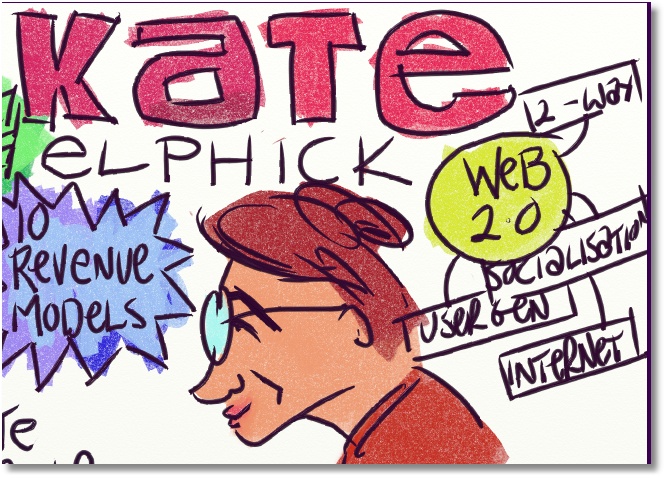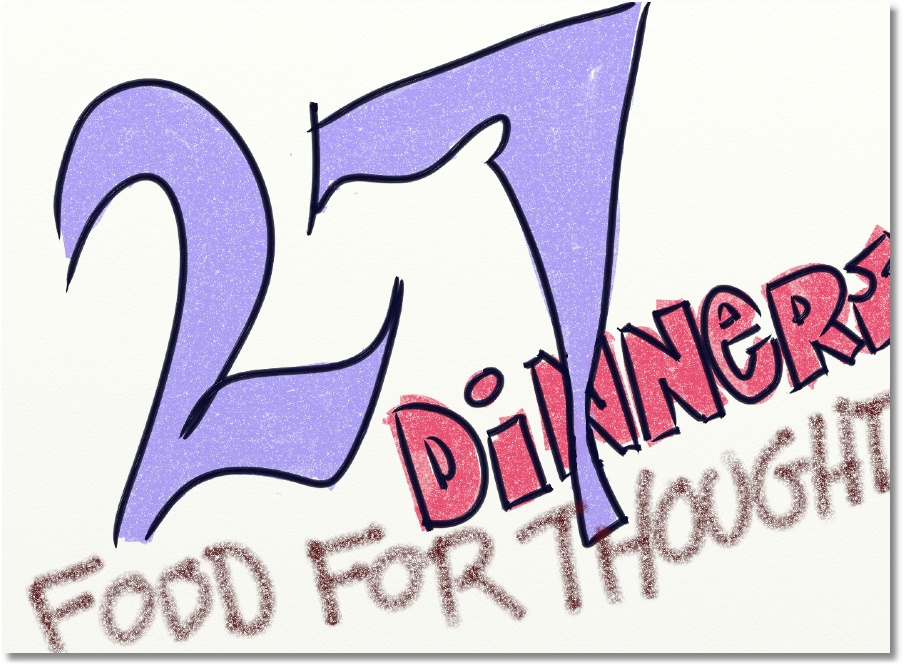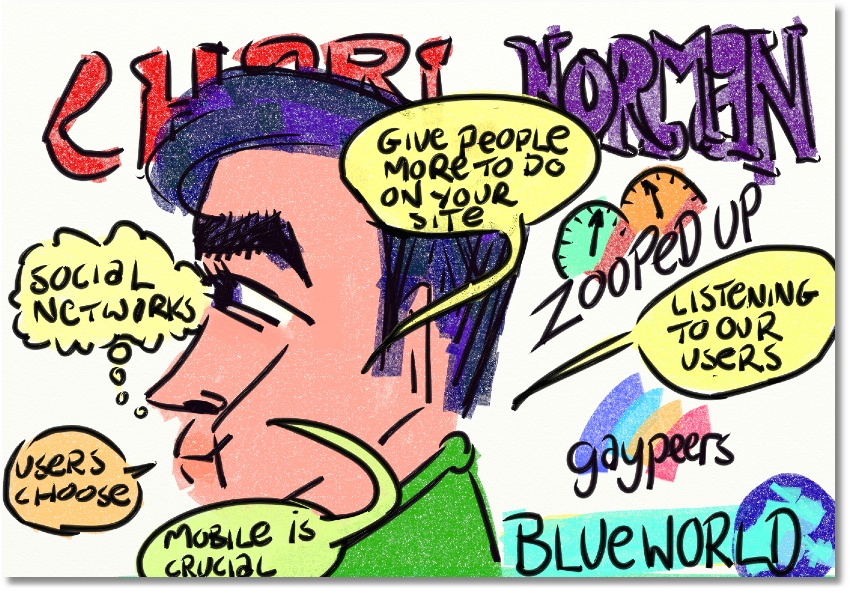 This is a slightly edited version of a comment I've left on a blogpost on MORALFIBRE: http://www.moralfibre.co.za/?p=262#comment-19
This is a slightly edited version of a comment I've left on a blogpost on MORALFIBRE: http://www.moralfibre.co.za/?p=262#comment-19In the post, Vince talks about his experience of the last 27 DINNERS (http://27dinner.com/) evening, at which I did the visual facilitation and live-blogging. Several people have responded in the comments to some of the less-than-desirable elements of the evening. (Luckily, my visual facilitation seems to have been well-received. Phshew!)
The stuff I'm talking about below pretty much all comes from my own experience as a speaker, standup poetry performer, street performer, salesperson, and corporate communications practitioner. I know that some of what I have to say might seem a little blunt, and possibly a tad harsh, and might make me a bit unpopular. At the same time, this stuff does need to be said.
Roy Blumenthal, the visual facilitator here.
THE IRRITATING AMERICAN
If I'm not mistaken, the 'irritating American' was Brian Carl Brown, Chief Operating Officer of http://www.bluecatalyst.co.za/. Are we talking about the guy who spoke about the golf day that noone wanted to attend??? If so, then yeah... Brian Carl Brown's yer man.
His colleague came up to me while I was wrapping up my drawing and live-blogging of the event, and proposed that Blue Catalyst and I might do some business together. I thought it would be a good idea. And we agreed to have talks about talks.
Shortly after the chat, Brian cannon-balled up to me, and announced, 'I think my colleague might not have gotten the point across. We're an NGO, and we don't have big budgets for our events, which are free.' Blah blah blah, poverty, blah blah, etcetera. 'So actually, we can't afford to pay you R8500 for a half-day's visual facilitation, or R12500 for a full-day. We haven't got money to pay you for the freebies. But if you do those, we might be able to get you some paying gigs. You get my drift?'
At that point, I was no longer listening. I work for a living. And the guy's attitude was actually pretty sucky. (But I think the presence of alcohol at events like this is a MAJOR contributor to the crapheadedness of some of the people present.)
KATE ELPHICK'S TALK
 Kate... You really really really really need to take a look at Garr Reynolds's site, PRESENTATION ZEN. Seriously. http://presentationzen.com/.
Kate... You really really really really need to take a look at Garr Reynolds's site, PRESENTATION ZEN. Seriously. http://presentationzen.com/.- One concept.
- One slide.
- One picture.
- No words, or VERY few words. Three or four words max.
- Your slide is a billboard for an idea.
- It's not an academic treatise to be read and mulled over.
- A presentation is real-time.
- It gives people the argument, supported by the facts.
Your presentation was very dense, and difficult to follow, for me.
I was also pretty alarmed at what I assume MUST have been my mishearing a stat your quoted. I THINK you said that the average black South African attends two funerals a week. If that's the case, I REALLY have to see your sources. And you really need to quote those sources. And you need to qualify what that stat actually means. I'm surrounded by some fairly average black South Africans, and, anecdotally evidenced, they absolutely DO NOT attend even two funerals a MONTH. let alone a week.
Re the cultural bias of the audience... hmmmm.... nope. GONG. That's spurious. Your presentation needs to be targeted at the people you're talking to. So if you're talking to an audience of whitey business people, you'd best find the argument that speaks to those people. Show the business-types video footage of the amazing response you're claiming your black audiences give you. Deliver on your premise.
I support Vince's reading of your argument. I feel you're making several untested and unsupported assumptions, and you're really not making that argument 'come to life'. (Yeah... pun intended.)
JASON HOBBS AND INTERFACE DESIGN
It started promisingly, with some really cool, simple, single-minded, focused slides, that we pretty much pictures illustrating a single point he was making. From around his third slide, the discipline disappeared. And he fell into the trap of cramming way too much stuff onto the slide, with almost NO logic to how things connected.
A presenter must NEVER have to apologise for the contents of their presentation being unreadable. Dammit. Those slides that he kept apologising for would have been unreadable in a pitch-black room on a high definition television screen. If you can't read your own slide on your computer screen, how the hell are we going to see it on a pasty big screen?
Jason also fell into the trap of telling us WAY too much about his topic. He brain-dumped his knowledge on us. And used ultra-lame examples to ground it. Google and iPhone are NOT great examples of UI. They are great examples of very specific points about UI.
Hone it down, dude. Choose ONE topic, and tell us about that.
CHARL NORMAN, BLUEWORLD (http://www.blueworld.co.za/)
I think he's probably being a tad hard on himself. For me, his talk was passionate, engaging, real, and grounded. I felt that he was sharing his thoughts with me as a conversation partner. He wasn't brain-dumping. He wasn't spewing facts and figures. He wasn't making unsupported arguments.
What he WAS doing was putting his expertise and experience on the table, and inviting others to share in his interpretation of his own successes.
Case study stuff.
Very nicely done.
MICROPHONE TECHNIQUE
One thing ALL of the presenters can learn about is microphone technique.
Here are the rules:
1. ALWAYS do a sound check. ALWAYS. Do NOT simply grab the mic and try to be audible. Every mic requires a specific approach to getting the best sound out of it. Did anyone else feel their ears disintegrating at the plosive 'p' sounds cranking out at full volume? That's avoidable. And easy to deal with.
2. NEVER tell an audience that you don't like using microphones. CHARL! We're there to HEAR you. Make it a JOY for us. We're not interested in your discomfort. And we're not interested in excuses. You HAVE something valuable to say. So embrace the platform, and do it.
3. Most microphones can be dealt with in one of two ways. EITHER put the mic in your hand with your fingers curled up just below the ball of the mic. Then extend your thumb out, and place it on your chin. This puts the mic directly in front of your bottom lip, an inch or so away from the pop-cap. MOST mics work best like this. Keeping your thumb extended in this way keeps the mic in position, and reminds you that you're talking to an audience who are hanging on your every word.
OR, put the mic ON your cheek, touching the corner of your mouth. Yes... that part of your mouth that gets little white spit flecks when you get old. Angle it slightly towards your lips, and keep it pressed to your skin. This only works for some mics. But when it works, it completely removes plosive pops.
4. PROJECT, people. Just cos you've got a mic doesn't mean you can talk like someone with emphysema. Projecting comes from working your diaphragm. Go for voice lessons if you can't get your voice to carry to the other end of a boardroom. And speak into the microphone with booming clarity, enunciation, and conviction.
THE NOISY CROWDS AND DRUNK ASSHOLES
Mike... this is directed towards you as the Joburg dude.
The organiser of an event needs to control the event. You must not be embarrassed to tell obnoxious winos to shut the fuck up. It's NOT acceptable for speakers to be whooped at. It's not acceptable for drunk Americans to hog the mic for a golf-day that geeks aren't interested in. It's not acceptable for a venue to allow a rowdie party upstairs to noise-out a gig. It's the organiser's duty to deal with these things. Throw people out if you have to. Call a halt to proceedings until things are sorted.
Speakers... YOU have a duty to pause in your talk if the conditions make it impossible to be heard. BUT... you also have a duty to make sure that your talk is fascinating and captivating. SOMETIMES people fidget and chat because the content and/or delivery of your talk is crap. Face this as a fact. Of course, sometimes, it's just the presence of a loud-mouthed drunkard overpowering an otherwise appreciative audience. Don't get so caught up in trying to deliver your message that you fail to see what's happening.
Desperation in a speaker is contagious. And becomes disastrous quite quickly. Learn how to deal with interruptions. Read up on heckling, and how standup comics deal with it. If you don't, you're letting yourself down. More importantly, you're letting your audience down.
STORMHOEK
Ban alcohol at business networking events.
Seriously.
The number of puke-smelling breaths that blasted into my face as people leered over my shoulder into my tablet-pc all merges into a nightmare swamp of inebriated dumbfuckery.
I have nothing against people getting plastered on their own terms, in their own environment. But when they're attending a geek dinner, aimed at helping them expand their circle of acquaintances, I'd really ask them to question their methods if those methods include quaffing industrial quantities of free wine.
What's the deal? Are they so poor they can't afford their OWN wine? Are they so low on self-esteem that the only way they can derive enough bravery to speak to another person is if they're falling down with pissedness?
Ask yourself this: If YOU were blasting YOUR wine-fumes (vomit-smell, by the way) into someone's face, would you expect them to take you seriously as a business contact? If so... drink away. But stay away from me. If not... then decline the refill of the Stormhoek blogging sensation.
27 DINNERS (http://27dinner.com/)
 I wonder if the zero-pricing of the event isn't building in an ethos of 'I'm here for myself only, and there are no consequences to me acting like an ass-wad, and I'd love to guzzle eight litres of free Stormhoek plonk, and I'll make a noise if I wanna, and I'll grab the mic when I can'?
I wonder if the zero-pricing of the event isn't building in an ethos of 'I'm here for myself only, and there are no consequences to me acting like an ass-wad, and I'd love to guzzle eight litres of free Stormhoek plonk, and I'll make a noise if I wanna, and I'll grab the mic when I can'?Maybe if people were paying for the event, they'd take the speakers more seriously?
What if people were able to get a sliding scale refund based on the crapness of the speakers?
If all three speakers are collectively voted as crap by the audience, then they get a full refund.
And speakers get a cut of the proceedings, so that they are incentivised to deliver great material. (They can give those proceedings to a charity, if they're not in it for the bucks.)
I've been to two 27 Dinners now. Jon Foster Pedley's was the first, and he had the discipline of using Pecha Kucha (http://www.pecha-kucha.org/) as the basis of his preso. And that made it work really powerfully for the audience. This past one also worked for me, but only cos I was working overtime at trying to pull out salient bits in my visual facilitation. I think if I'd been a member of the audience, the only talk I would have paid attention to would have been Charl Norman's. The other two were simply not gripping enough, and not polished enough, and didn't contain enough of an argument to be compelling.
- You can take a look at my live-blog of the evening here: http://schmucknews.blogspot.com/2008/07/live-visual-facilitation-coverage-of-27.html
- My visual facilitation portfolio is on my Flickr gallery at: http://snipurl.com/visualfacilitation
- My profile as a Professional member of PSASA, the Professional Speakers Association of Southern Africa is at: http://snipurl.com/psasa-profile




Roy,
ReplyDeleteI think you need to manage your expectations of the 27dinners. They’re not professional business networking events. That’s what First Tuesday is for, and you pay for that. They were born out of a desire to see geeks and business people interact and maybe even collaborate surrounded by good food, drink and with a few informal talks thrown in as added value. Most dinners cost us money, so there is very little commercial drive behind it.
Primi gives us their venue for free (unfortunately I don’t have a spare R 6000 to spend on a better, us-only venue). Speakers are ordinary people, speaking on something they are passionate about and by invitation. Sure I agree that sometimes this is abused and people speak for too long and I’m working on ways to correct this. One could argue that you should not have arrived with no screen to project on to as a professional visual facilitator, but in the spirit of the 27dinners I didn’t take issue with the dowels and sheet!?
Trust me, it’s not easy organising the whole thing on your own. Though please understand I am making it a priority to work on all of these issues.
This was the last dinner though, having said all this, that:
1. Anyone will make an announcement without prior arrangement
2. Speakers can speak without a time limit - we’ll actually show the time and stop them at 20 min (absolutely max)
3. More than one speaker will speak - in future we’ll have a speaker and a panel, and maybe one other activity.
And so on.
Hope that helps…
Followed up my last comment on www.moralfibre.co.za...
ReplyDelete